#Peter Randall-Page
Text
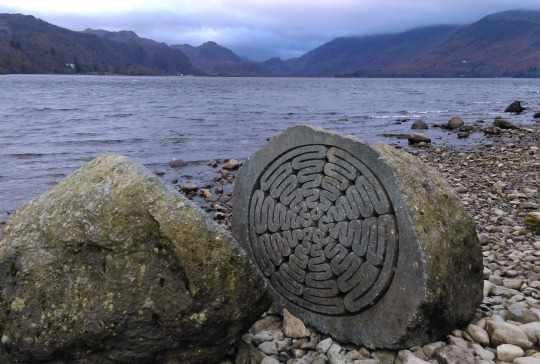
Peter Randall-Page: 'Hundred Year Stone' (1995)
4K notes
·
View notes
Text

Peter Randall-Page: 'Hundred Year Stone' (1995)
#geology#nature#art#rocks#maze#lake#mountains#landscape#landscapes#earthy#earthcore#aesthetic#1995#90s#sculpture#peter randall-page
2K notes
·
View notes
Text

Peter Randall-Page
10 notes
·
View notes
Photo









Yorkshire Sculpture Park
1-4: Mikayel Ohanjanyan: Diario
5: Peter Randall-Page: Mind Walk
6: Tom Friedman: Hazmat Love
7: Unkown
8-9: Katrina Palmer: The Coffin Jump
#Mikayel Ohanjanyan#Peter Randall-Page#Tom Friedman#Katrina Palmer#yorkshire sculpture park#jamie's chitchat#photography
4 notes
·
View notes
Text
I DID THIS TO A PIC OF A PETER RANDALL-PAGE SCULPTURE 2 YEARS AGO ASDKLJHASKDJHASKDJAHS

0 notes
Photo

Hundred Year Stone - Peter Randall-Page
278 notes
·
View notes
Text



Hundred Year Stone, Peter Randall-Page
source
1K notes
·
View notes
Text





Peter Randall-Page was born in the UK in 1954 and studied sculpture at Bath Academy of Art from 1973-1977. During the past 40 years Peter Randall-Page has gained an international reputation through his sculpture drawings and prints.
His practice has always beeninspir ed by the study of natural phenomena and its subjective impact on our emotions. In recent years his work has become increasingly concerned with the underlying principles determining growth and the forms it produces. In his words “geometry is the theme on which nature plays her infinite variations, and can be seen as a kind of pattern book on which the most complex and sophisticated structures are based.”
He was awarded an Honorary Doctorate of Arts from the University of Plymouth in 1999, an Honorary Doctorate of Letters from York St John University in 2009, an Honorary Doctorate of Letters from Exeter University in 2010, and an Honorary Doctorate of Letters from Bath Spa University in 2013. In June 2015 Peter was elected as a Royal Academician in the category of sculpture.
https://www.peterrandall-page.com/category/drawings/
295 notes
·
View notes
Text
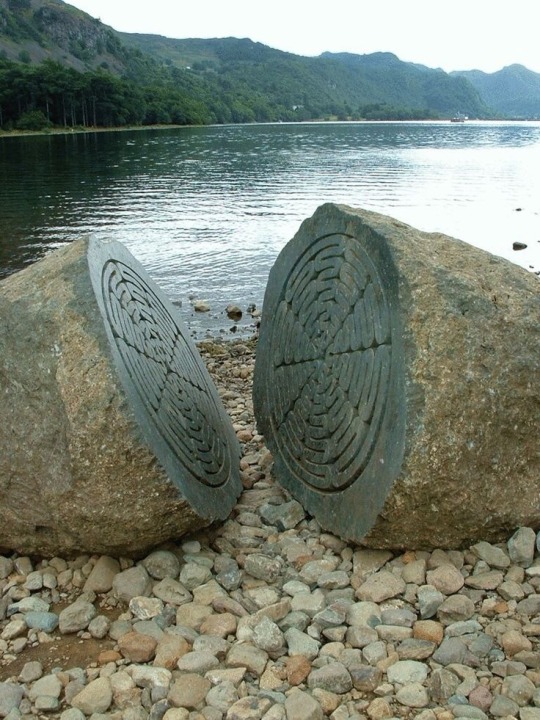
Peter Randall-Page: 'Hundred Year Stone' (1995)
2K notes
·
View notes
Text
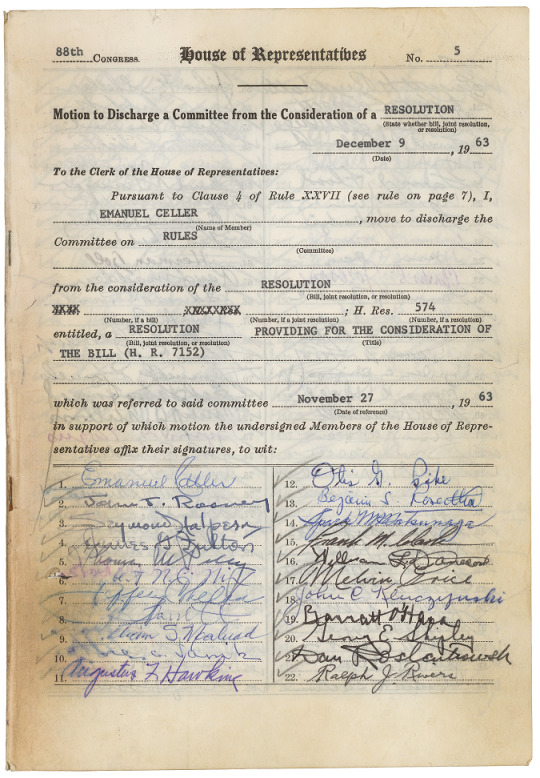
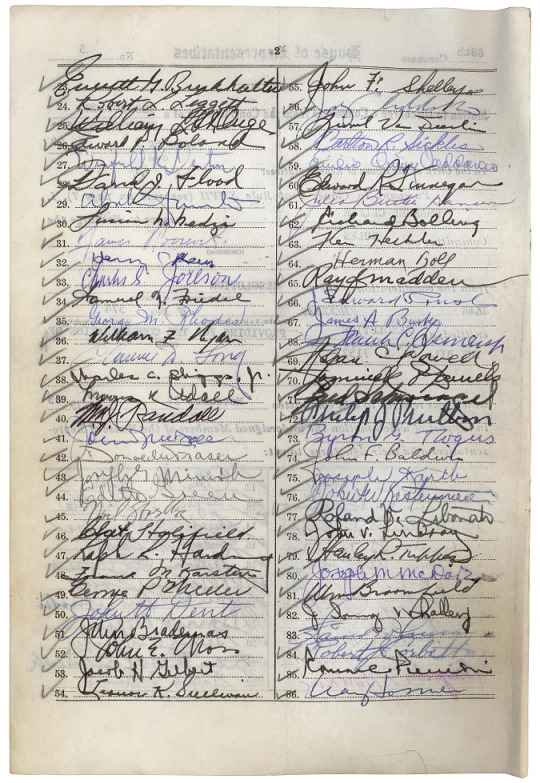
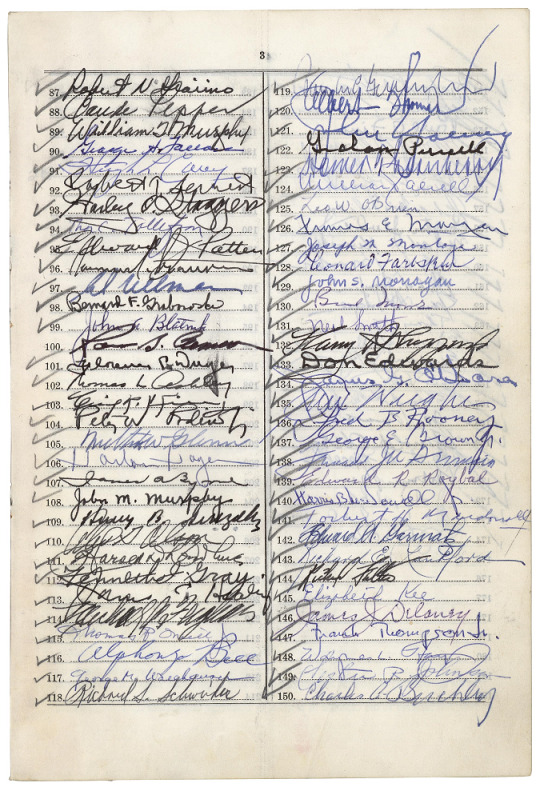

Discharge Petition for H.R. 7152, the Civil Rights Act of 1964
Record Group 233: Records of the U.S. House of RepresentativesSeries: General Records
This item, H.R. 7152, the Civil Rights Act of 1964, faced strong opposition in the House Rules Committee. Howard Smith, Chairman of the committee, refused to schedule hearings for the bill. Emanuel Celler, Chairman of the Judiciary Committee, attempted to use this discharge petition to move the bill out of committee without holding hearings. The petition failed to gain the required majority of Congress (218 signatures), but forced Chairman Smith to schedule hearings.
88th CONGRESS. House of Representatives No. 5 Motion to Discharge a Committee from the Consideration of a RESOLUTION (State whether bill, joint resolution, or resolution) December 9, 1963 To the Clerk of the House of Representatives: Pursuant to Clause 4 of Rule XXVII (see rule on page 7), I EMANUEL CELLER (Name of Member), move to discharge to the Commitee on RULES (Committee) from the consideration of the RESOLUTION; H. Res. 574 entitled, a RESOLUTION PROVIDING FOR THE CONSIDERATION OF THE BILL (H. R. 7152) which was referred to said committee November 27, 1963 in support of which motion the undersigned Members of the House of Representatives affix their signatures, to wit: 1. Emanuel Celler 2. John J. Rooney 3. Seymour Halpern 4. James G Fulton 5. Thomas W Pelly 6. Robt N. C. Nix 7. Jeffery Cohelan 8. W A Barrett 9. William S. Mailiard 10. 11. Augustus F. Hawkins 12. Otis G. Pike 13. Benjamin S Rosenthal 14. Spark M Matsunaga 15. Frank M. Clark 16. William L Dawson 17. Melvin Price 18. John C. Kluczynski 19. Barratt O'Hara 20. George E. Shipley 21. Dan Rostenkowski 22. Ralph J. Rivers[page] 2 23. Everett G. Burkhalter 24. Robert L. Leggett 25. William L St Onge 26. Edward P. Boland 27. Winfield K. Denton 28. David J. Flood 29. 30. Lucian N. Nedzi 31. James Roosevelt 32. Henry C Reuss 33. Charles S. Joelson 34. Samuel N. Friedel 35. George M. Rhodes 36. William F. Ryan 37. Clarence D. Long 38. Charles C. Diggs Jr 39. Morris K. Udall 40. Wm J. Randall 41. 42. Donald M. Fraser 43. Joseph G. Minish 44. Edith Green 45. Neil Staebler 46. 47. Ralph R. Harding 48. Frank M. Karsten 49. 50. John H. Dent 51. John Brademas 52. John E. Moss 53. Jacob H. Gilbert 54. Leonor K. Sullivan 55. John F. Shelley 56. 57. Lionel Van Deerlin 58. Carlton R. Sickles 59. 60. Edward R. Finnegan 61. Julia Butler Hansen 62. Richard Bolling 63. Ken Heckler 64. Herman Toll 65. Ray J Madden 66. J Edward Roush 67. James A. Burke 68. Frank C. Osmers Jr 69. Adam Powell 70. 71. Fred Schwengel 72. Philip J. Philiben 73. Byron G. Rogers 74. John F. Baldwin 75. Joseph Karth 76. 77. Roland V. Libonati 78. John V. Lindsay 79. Stanley R. Tupper 80. Joseph M. McDade 81. Wm Broomfield 82. 83. 84. Robert J Corbett 85. 86. Craig Hosmer87. Robert N. Giaimo 88. Claude Pepper 89. William T Murphy 90. George H. Fallon 91. Hugh L. Carey 92. Robert T. Secrest 93. Harley O. Staggers 94. Thor C. Tollefson 95. Edward J. Patten 96. 97. Al Ullman 98. Bernard F. Grabowski 99. John A. Blatnik 100. 101. Florence P. Dwyer 102. Thomas L. ? 103. 104. Peter W. Rodino 105. Milton W. Glenn 106. Harlan Hagen 107. James A. Byrne 108. John M. Murphy 109. Henry B. Gonzalez 110. Arnold Olson 111. Harold D Donahue 112. Kenneth J. Gray 113. James C. Healey 114. Michael A Feighan 115. Thomas R. O'Neill 116. Alphonzo Bell 117. George M. Wallhauser 118. Richard S. Schweiker 119. 120. Albert Thomas 121. 122. Graham Purcell 123. Homer Thornberry 124. 125. Leo W. O'Brien 126. Thomas E. Morgan 127. Joseph M. Montoya 128. Leonard Farbstein 129. John S. Monagan 130. Brad Morse 131. Neil Smith 132. Harry R. Sheppard 133. Don Edwards 134. James G. O'Hara 135. 136. Fred B. Rooney 137. George E. Brown Jr. 138. 139. Edward R. Roybal 140. Harris. B McDowell jr. 141. Torbert H. McDonall 142. Edward A. Garmatz 143. Richard E. Lankford 144. Richard Fulton 145. Elizabeth Kee 146. James J. Delaney 147. Frank Thompson Jr 148. 149. Lester R. Johnson 150. Charles A. Buckley4 151. Richard T. Hanna 152. James Corman 153. Paul A Fino 154. Harold M. Ryan 155. Martha W. Griffiths 156. Adam E. Konski 157. Chas W. Wilson 158. Michael J. Kewan 160. Alex Brooks 161. Clark W. Thompson 162. John D. Gringell [?] 163. Thomas P. Gill 164. Edna F. Kelly 165. Eugene J. Keogh 166 John. B. Duncan 167. Elmer J. Dolland 168. Joe Caul 169. Arnold Olsen 170. Monte B. Fascell [?] 171. [not deciphered] 172. J. Dulek 173. Joe W. [undeciphered] 174. J. J. Pickle [Numbers 175 through 214 are blank]
33 notes
·
View notes
Note
Hello! The conversation about careening had me wondering--how do you like to do research for your stories? Are there any topics or sources you particularly enjoy delving into or including in your work?
Hello, my friend!!! What a wonderful ask: thank you for these great questions.
After reflecting, I think I could describe my process as having two general categories: as-needed research and broader worldbuilding research.
The first category is a part of almost every fic I write, and it involves things like sourcing locations, verifying timelines, tracking down character names, and (very often) looking up what it feels like to receive various injuries. If it's a Star Wars fic, at least one Wookiepedia visit is a given (the raw materials page is a frequent hit). And there are likely to be a few other general internet searches I repeat several times ("aviation terms," for example, or "New Orleans plant life," depending on the fic and fandom).
The second category covers the exploratory reading and viewing I do for fics that involve more worldbuilding because they extend further outside (or completely outside) canon. The Codywan Pirate AU has me doing all kinds of targeted searches for naval ranks and sailing ship terminology, for example, but I've also been browsing maritime museums for descriptions of what life on ships was like from day to day (look at this cool page about sailor libraries and sailing literature!) and for images that give me a visual sense of the environment. I also love looking at digitized resources through academic libraries. When @festiveferret and I were collaborating on Citation Needed, an MCU professor AU in which history prof Tony is writing a monograph about weapons development during WWII, I used the online special collections at University of Massachusetts - Amherst to learn what the primary documents (enlistment records, ration cards, etc.) featured in the fic would look like. (Ferret then did incredible edits for the epistolary portion of the fic: this post has the collected documents.)
In a couple cases it's actually been the research that has come first and inspired the fic. The initial ideas for Separation, for example, which is a Top Gun fic that leans into the context of the AIDS crisis in the 80s and 90s, came from prep that I'd been doing for a queer literature class, so I was listening to music by queer bands in the period, reading poetry and essays about queer life in NYC and San Francisco (including this piece that discusses Nan Goldin, Thom Gunn's The Man with Night Sweats, "The Fall of 1992" by Randall Mann, and Alexander Chee's essay "After Peter"), and watching the documentary How to Survive a Plague, about the ACT UP movement. Much of that research informed the choices I made in writing the fic, even if it doesn't all appear directly.
Finally, I should confess that I am pretty self-indulgent with my fic research: I spend a lot of time studying and tracking things down when it's a subject I find interesting and/or when having more information will allow me to texture the choices I'm making in ways I personally find compelling; but I am also very unfussed about leaving other things vague or about fudging some details in service of the story. It's not at all out of the ordinary for me to spend 30 minutes looking up the names of camera models that hit shelves in 1991 and then write a sentence that says "when he gets off the carrier in mid-July, he goes to the mall" without specifying which carrier or which mall, because I couldn't be bothered to figure out the military logistics involved. This is one of the joys of writing fic for me: freedom to pour energy into those areas where research helps get me closer to things I want to discover and describe.
Thank you again for the terrific asks, my friend!!! This was very fun to write. <3<3<3
13 notes
·
View notes
Text
There's nothing in comics like reading a run and a couple of fill issues by a completely different writer are inserted into the run for discovering and gauging your feelings about said fill writer. Because if you're not paying close attention you might miss it, but you find yourself suddenly perking up and going 'ooh I like this storyline' (or alternatively 'what the fuck just happened, I hate this') and you flip to the front of the issue and look at the title page and suddenly realise. Oh. It's YOU.
Notable Writers who have done this to me in various places include:-
Peter J. Tomasi
Fabian Nicieza
Marguerite Bennett
Benjamin Percy
Alan Grant
Barbara Randall Kesel
Christopher Priest
#Tomasi just did it to me again in Outsiders 2003#'why is this suddenly 300% more entertaining? and all the gratuitous sex is suddenly gone? Ah. Hi Tomasi.'
16 notes
·
View notes
Text
New Exhibit | Openings: Title Pages in the History of Printed Books

Detail from the opening page of Appianus, "Historia Romana," Venice: Erhard Ratdolt and Peter Löslein, 1477. Incun 118, Special Collections Research Center. Photo by Randal Stegmeyer.
Explore the creativity and utility of an essential part of practically every modern book— the title page! Such pages signal and inform, incite pleasure and intrigue, as well as conceal and mislead.
On display in the Special Collections Research Center on the 6th floor of the Hatcher Library are works from our University Library collections illuminating critical moments in the history of books. Students in a Fall 2022 History Lab class researched and created the exhibit.
The exhibit is available for viewing Monday-Friday, 10 am to 5pm.
We hope you'll enjoy exploring this fascinating material!
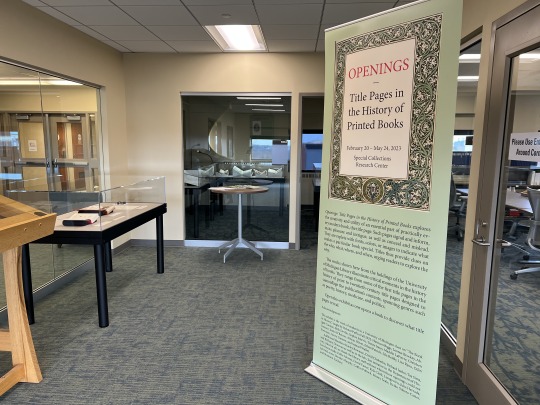
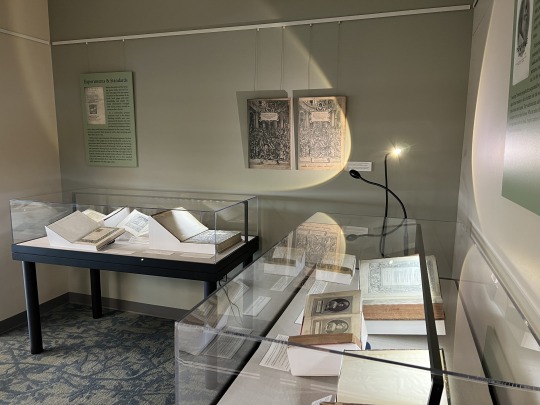
Openings: Title Pages in the History of Printed Books is on display in the Special Collections Exhibit Space (6th floor, Hatcher Graduate Library) until 24 May 2023
#exhibitions#exhibits#library exhibits#special collections#special collections libraries#special collections and archives#archives#rare books#title pages#student curators#libraries#libraries and archives
55 notes
·
View notes







